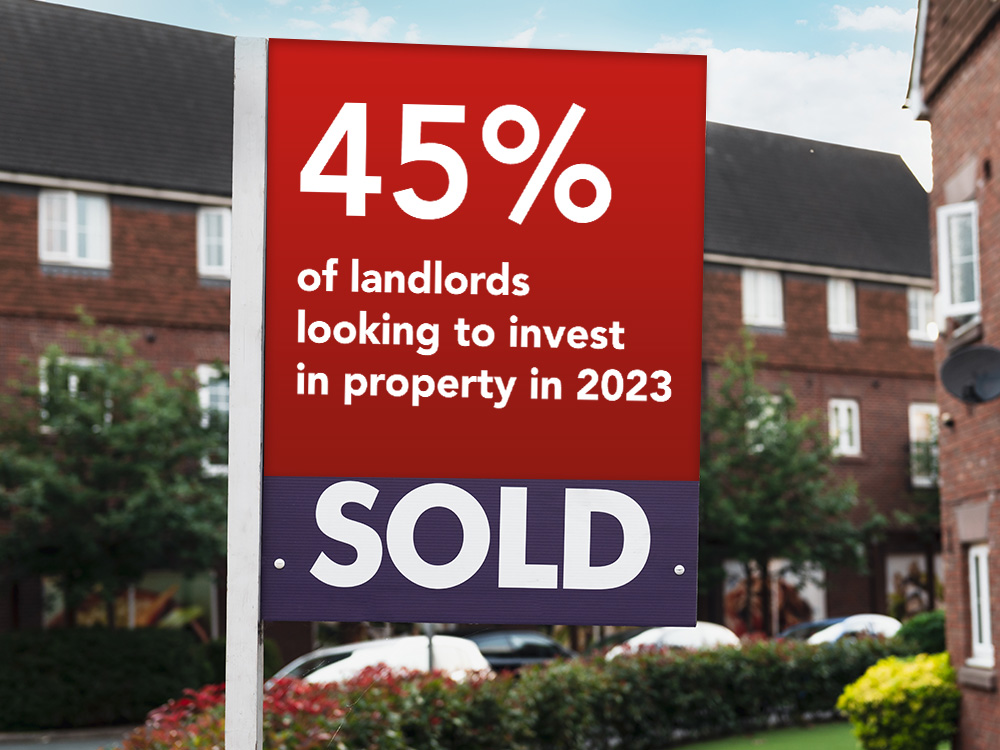45% of landlords looking to invest in property in 2023 - but they face issues sourcing properties

Our recent survey of 1,001 UK landlords discovered that although 45% believe they will invest in property in 2023, more than half (53.85%) are struggling to find suitable investment properties.
As Finbri's Stephen Clark, comments, “Nearly half of UK landlords are keen to invest in property, but the current market conditions have made this increasingly difficult for them to do so. The survey results demonstrate that this is due to the limited availability, the likelihood of increasing interest rates and uncertainty surrounding the current economic climate.”
At the same time, 45% of landlords have said they are looking into alternative forms of investment, such as stocks and shares, tangible assets or even cryptocurrency, to diversify their portfolios. A further indication of the significant pressure landlords currently find themselves under.
Issues for landlords sourcing investment properties
The sense of uncertainty about property investment is reflected in landlords' responses when asked how they feel about investment opportunities. 43.26% were Strongly concerned (20.18%) or Concerned (23.08%), whilst 40.56% were Optimistic (21.68%) or Very optimistic (18.18%). 16.18% of landlords felt neither concerned nor optimistic.
Our UK Landlords' Report found that over half of landlords (53.85%) are struggling to source suitable investment properties as a result of limited stock availability. Additionally, the report discovered 45.35% of landlords are either Concerned or Strongly concerned about a property crash, and 43.26% are worried about the current investment opportunities for properties.
How do landlords feel about increasing interest rates?
As described in the report, "The Bank of England (BoE) increased interest rates by 0.5 percentage points to 3.5% in December. The ninth consecutive rate increase and the highest level in 14 years. As recently as December 2021, the base rate was 0.1%, and it’s a concern for landlords who are likely to have multiple forms of financing in the form of bridging loans and buy-to-let mortgages. Whilst landlords on fixed-rate mortgages won’t see their mortgage increase during their fixed-term, should the mortgage need to be renewed, it’s likely that the monthly payments will increase. Likewise, if the mortgage is on a tracker or standard variable rate (SVR), then monthly payments will increase in line with the increased rates. These increasing rates have 49.55% of landlords Concerned (26.97%) or Strongly concerned (22.58%). "
Increasing mortgage rates forcing investors to sell up
The survey identified that if the base rate reaches a high of 4.5%, as predicted, 44.66% of investors will look to sell their investment property/properties.
This indicates that investors are aware of the potential risks in the current climate and are looking to avoid increased mortgage costs. In addition, investors may be concerned that higher interest rates would cause tenants to struggle to pay their rent, leading to more defaults and an increase in void periods.
Increased competition from overseas investors as the value of the pound has plummeted
With the growing demand for rental property and the weakened pound, the UK has long been a preferred location for overseas property investors. A recent analysis reveals that the continuous depreciation of the pound is just adding to the allure.
However, after a chaotic end to 2022, whilst UK investors waited to see how the housing market and economy reacted, foreign investors recognised an opportunity. Homebuyers from the United States have profited from a falling pound because the average home in the UK now costs 14.8% less.
Ultimately, the best way to stay competitive is to research thoroughly and act quickly when a suitable property is identified. House prices are falling and with the right strategy, domestic investors and landlords can still find attractive opportunities in the UK despite the competition from international buyers.
What alternatives might landlords invest in?
Should a lack of property be available, 31.97% of landlords would consider stocks and shares to diversify their investment portfolios. Additional options for investment were tangible assets (26.37%), cryptocurrency (25.47%), forex trading (also known as foreign currency exchange trading - 25.27%) and private debt (25.17%). 16.98% said there were no alternative investments they’d consider.
Final thoughts
Despite 45% of investors looking to further invest in property in 2023, the growing number of challenges such as limited availability of suitable properties, increasing interest rates, low levels of confidence and uncertainty around the current economic climate, as well as increased competition from overseas investors, are making it increasingly difficult for them to do so.
Investors want to invest. And if property is unavailable or the interest rates make BTL mortgages unattractive, landlords may start to look away from the property market for their investment opportunities.
The private rental market is vital in the broader UK housing market as it provides accommodation for those unable to get on the property ladder and landlords with an income. If landlords have no choice but to leave the market, this would negatively impact renters, and the overall UK property market.
Bridge To Let
We offer rapid bridge to let finance enabling landlords & investors take advantage of BTL residential property opportunities to extend their portfolio.
Discover More





